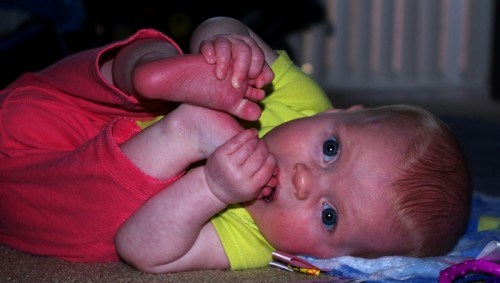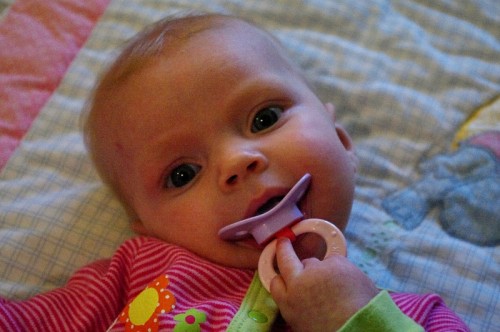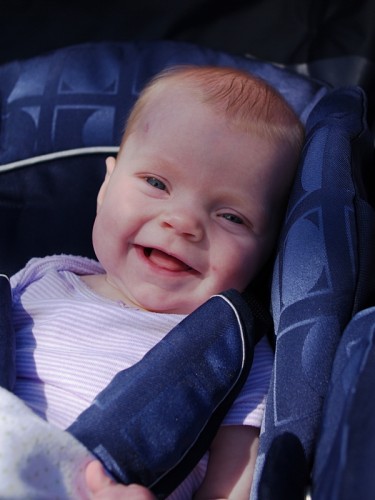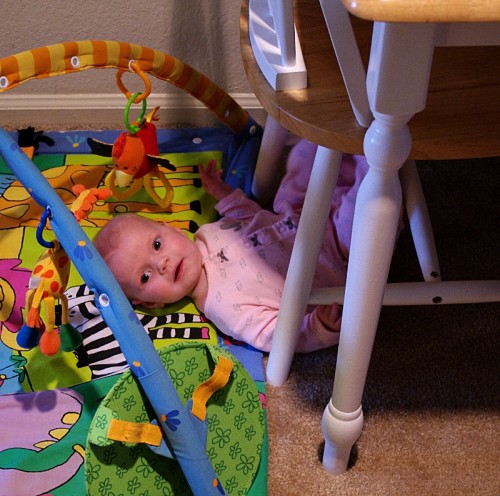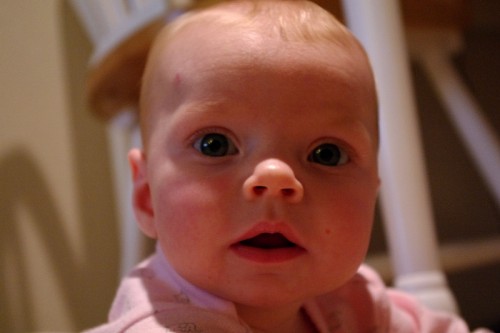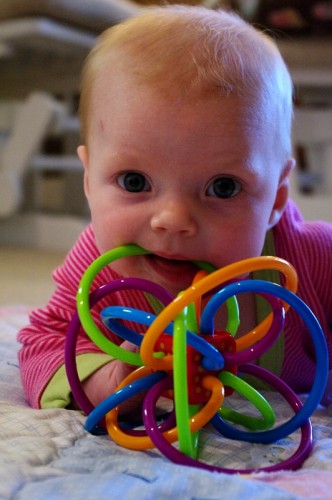- Sleep deprivation makes everything worse.
- I am not, by nature, a flexible person. I love predictability. Unfortunately, Heather abhors a schedule. I’m working on coping.
- Our upstairs neighbors love nothing more than to vacuum and/or shower. (Does all the vacuuming make them sweaty?) I never noticed until I had a baby to be startled by sudden noises when she’s nursing at 3:30am and they turn the water on full blast.
- I have always taken the ability to fall asleep just because you’re tired for granted. Apparently, babies don’t know how to do this.
- NEVER live next to a preschool. It’s annoying when the screaming children wake you up. It is both infuriating and tragic when they wake up your baby.
- A little Zoloft can go a long way.*
- Bouncing on an exercise ball is an effective way to put a baby to sleep. (This still makes no sense to me, but it’s what works for Heather.)
- Bouncing on an exercise ball doesn’t burn nearly as much fat as you might think it would.
- Grump is a verb, as in “Heather was grumping all afternoon, so we went for a walk. It didn’t help; she grumped half the way home, too.”
Year: 2012
5 months (and 1 week (and 4 days))
Yeah, this post is a bit late. Sorry.
Well, I said last month that Heather’s feet would be in her mouth soon, right? Here you go:
She chews on her toes all the time. She even spent most of Relief Society one week, laying on my lap with both her feet pulled up to her mouth, going from one foot to the other. She’s also started sucking/chewing on her thumb, though not for very long at a time. It’s pretty much the cutest thing ever. And I don’t know if she’s actually teething yet or not, but she has definitely figured out biting/chewing. She spends as much time chomping on things as sucking on them these days. Even her pacifier! Speaking of which, she learned a trick a few weeks ago, going from this:
While sucking on the binkie, she opens her mouth as wide as she can, then pops the bottom edge of the binkie in with her fingers (while keeping the nipple in there, too) and bites down on it. I don’t know why this is so entertaining for her, but she does it all the time.
Solids are going great. She’s now eaten rice cereal, oatmeal, barley cereal (mixed with prune juice these days, to keep things moving), avocado, and sweet potato. (This week, her new food will be butternut squash!) So far, she’s loved everything we’ve fed her, though lately she seems to like the cereal less than before.
My least favorite recent development is that Heather will no longer fall asleep for Kyle. We have no idea why. This sucks because putting her down for naptime/bed was already my least favorite part of the day, and now I get no relief. On the subject of sleep, though, she’s started doing very strange things when she’s trying to settle down to sleep. She sleeps in basically two positions: (1) flopped over to one side or the other, with her legs out in front so she makes an “L,” or (2) flat on her back, with her hands up behind her head, elbows out, and her feet up near her bum, with her knees flopped out (yes, it looks ridiculous). Oh, and Henrietta is usually over her face. But before she’ll settle into either of these positions, she flops around like a crazy person! Her hands/arms pull up so she can rub her face in Henrietta, and her legs get pulled up, straightened out, and then slammed down onto the mattress, not unlike a bull pawing the ground before charging. Over and over and over. It’s insane, and I have no idea how it helps her relax. But it seems to.
Heather can laugh now, but Kyle’s the best at getting her to do it. It’s mostly when you tickle her, or do something along those lines. It’s really weird though, this kind of barking chuckle.
She really likes going for walks in her stroller. She just sits up (sometimes even leaning forward) and LOOKS at everything. Cars going by always get her attention, and it’s funny to see her head whip around as she follows them.
All of a sudden, Heather became quite mobile. She’s been able to roll from her stomach to her back for a while now, and there was a lengthy lead-up to learning that skill. But one morning, she just started rolling from her back to her front, and now there’s no containing her. She can roll around all over the place, and she can squirm a little bit to get things that are just out of her reach. It’s pretty funny to look away, then realize she’s moved a few feet in the time you were checking your email. The other morning, I laid her down on her playmat, then sat down to eat my breakfast. When I got up to put my dishes away, she was like this:
Originally, she had been turned the other direction (feet to the left of the picture) and was entirely on the mat. I really can’t figure out how she wriggled down between the chair legs like that.
So, to begin with, Heather would swat at things with her fists. Then she progressed to grabbing things. Now, she’s on to touching things. She’ll reach out and just kind of feel the hanging toys on her playmat. It’s really cute. And while she’s nursing, she’ll often reach up and play with my hand or try to reach some of my hair so she can run her fingers through it. (Also, she loves Kyle’s hair. She thinks it’s super fun to run her hands through.) She also reaches out for faces, particularly mouths. And when we read to her, she’ll sit way forward and try to grab the pictures on the pages. When do babies recognize the difference between pictures and real objects?
I was all set to tell you all that Heather’s sleep has gone back to normal, and even improved. For several days, that was true. It was easy to get her down, and she’d even nap for an hour or two at a time, which she has never done with any regularity. But now we’re back to lousy naps again. Honestly, I feel like I have two babies. Happy Heather seems to only show up for a few days at a time every few weeks, but she’s fantastically awesome and fun. She naps like a rockstar and is happy and a true joy when she’s awake. But mostly, we get Fussy Heather, who naps very poorly and is only really happy for a half hour or so after waking up. Much of the rest of the day, she’s cranky and clingy and very demanding, not enjoying anything for very long. I wish I knew how to make her happier more often. My personal theory is that something makes her uncomfortable (gas, constipation, teething, whatever), which both irritates her and keeps her from sleeping well, making things even worse. I don’t know if that’s accurate or not, though, and even if it is, it’s difficult to tell what’s bothering her or how to help.
Even so, she’s totally adorable and we love her very much. How could you not love this face?
Henrietta
This is Henrietta, Heather’s pink hippo sleepytime buddy:
You have _got_ to be kidding me
I am enraged right now.
I just got our AT&T phone bill for this month. Once again showing their complete disregard for their customers, they’ve taken it upon themselves to increase my bill by 32% with no explanation or prior warning.
I hate AT&T with the fiery passion of one thousand suns.
And still my only recourse would be to switch to Comcast which is easily as abusive as AT&T, but charges more for the same privilege.
I’ve sent an email begging Sonic.net to bring their Fusion DSL service to Livermore which offers 20 Mbps service plus phone for $39.95 a month. After an introductory offer expires we’ll be paying $69 a month for 6 Mbps service plus phone.
It is insane.
Post hoc ergo propter hoc
The Economist hosted a debate between security expert Bruce Schneier and former TSA-administrator Kip Hawley on the topic of whether the changes to airport security since 9/11 have done more harm than good.
It was well done and consisted of opening statements, rebuttals, and closing statements from each participant.
Hawley’s opening statement begins with:
More than 6 billion consecutive safe arrivals of airline passengers since the attacks on America on September 11th 2001 mean that whatever the annoying and seemingly obtuse airport-security measures may have been, they have been ultimately successful.
He continues on and on using the reasoning that because no airplanes have been successfully attacked it means the TSA has been effective and therefore worth its inconvenience, cost, and violation of civil rights.
This is a clear-cut case of post hoc ergo propter hoc reasoning. He presents no further evidence other than first the TSA was created and second no successful attacks have occurred as proof that the TSA is successful.
Post hoc ergo propter hoc can be phrased as follows: First A occurred, then B occurred, therefore A caused B. This, however, is frequently not true and is not valid reasoning without further evidence better tying together the events of A and B.
Using post hoc ergo propter hoc reasoning as the sole basis of maintaining the current absurdity of the TSA is unacceptable.
But let’s rephrase the relationship and re-examine the reasoning. Let’s phrase the relationship like this:
If the TSA is effective then there will be no successful attacks on U.S. airplanes
Now let’s include the knowledge that no successful attacks have occurred. What can we say about the TSA’s efficacy?
Interestingly enough, nothing. If the if-then relationship is true, knowing the “then” clause is true tells us nothing about the “if” clause.
Logically, if-then statements can be rewritten. “If A then B” is equivalent to “B or not A.” Using an example: “If it is raining then the ground is wet” is equivalent to “The ground is wet or it is not raining.”
The re-writing makes it easy to see that when we know the ground is wet we don’t actually learn anything about whether it is raining or not. It might be raining, and the wet ground provides evidence for that hypothesis, but the ground may be wet because a lawn sprinkler is running, or someone spilled a cup of water. We don’t know why the ground is wet, only that it is.
So let’s rewrite our proposed relationship between the TSA and airplane safety:
There will be no successful attacks on U.S. airplanes or the TSA is not effective.
Knowing that there have been no successful attacks tells us nothing about whether the TSA is effective or not.
This is an incredibly important piece of formal logic to understand because it is almost always misused in common practice.
So the real relationship that Hawley is providing evidence to argue is this:
If there are no successful attacks on U.S. airplanes then the TSA is effective.
But this statement doesn’t mean what Hawley wants it to mean. Given that there are no successful attacks on U.S. airplanes does mean that the TSA achieved its operational goal, but it does not tell us anything about whether the TSA’s actions contributed to that result or not because the causation is backwards.
It is equivalent to saying: “If I got an A on the test then I learned the material.” Which is not necessarily true (you may have cheated or made lucky guesses). The correct causation should be, “If I learned the material then I will have gotten an A on the test.”
In order for the test->learned form to tell us something meaningful about the consequent (the “then” part) we need additional criteria: “If I got an A on the test, and I did not cheat, and I did not make lucky guesses then I learned the material.”
[Updated 4/14 with more obvious example]
Another example would be to say I have a magic wand that causes things to fall to the ground when you let go of them. I’m holding the wand, you let go of something, it falls to the ground. So I posit, “If the object falls to the ground, then my wand works.” Knowing that the object falls to the ground doesn’t really tell you anything about whether my magic wand had anything to do with it. The stated purpose of the wand was achieved, but it had nothing to do with the wand.
The point being that in this reverse-causation form we have to account for all possible causes in the antecedent (the “if” part) in order to arrive at the consequent–an impossible task given the number of things that are unknowable regarding airplane security.
There may be no successful attacks on U.S. airplanes for many reasons and we would need to account for all of them before declaring the TSA effective. A silly one is simply that there might be no U.S. airplanes (in which case there could be no attacks against them, successful or otherwise, regardless of the TSA’s efficacy).
A serious reason could be that there is not anyone trying to attack. And if we count the number of terrorists that the TSA has actually caught (zero), this is true. If your argument is then that those who would attack were deterred from even trying, then the burden is on you to provide evidence that this has occurred.
My position remains that if terrorists were intent on blowing something up and decided that an airplane was too difficult they would not just give up and go home. If the TSA is deterring terrorists from attacking airplanes then those same terrorists would be blowing up grocery stores, malls, schools, dams, airport security lines (like the terrorist attack in Russia in 2011), or any of thousands of other completely unprotected targets.
Bruce Schneier argued for the responsible action: Disassemble the TSA, return airport security to pre-9/11 levels, and divert the TSA’s budget to intelligence gathering, law enforcement, and emergency response.
Following this plan would provide greater protection for all targets with no meaningful reduction to the security of airplanes. And, as a bonus, you would waste less time in airport security lines, have fewer Constitutional rights violated when traveling, and your ticket would cost less.
